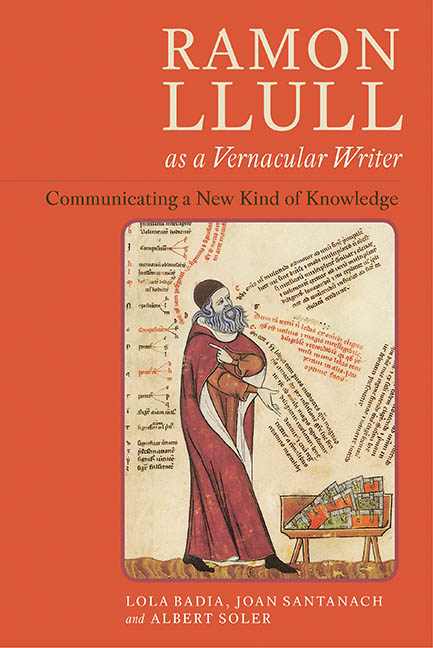Book contents
- Frontmatter
- Dedication
- Contents
- Illustrations
- Acknowledgements
- Abbreviations
- Introduction
- 1 Ramon Llull's Art, Language, and Literary Expression
- 2 Style and Genre in the Writings of Ramon Llull
- 3 The Composition and Dissemination of Ramon Llull's Texts, from Script to Print
- 4 Ramon Llull's Vernacular Context
- Epilogue. Ramon Llull's OEuvre as a Whole: Autobiographism and Self-Referentiality
- Appendix 1 First-Generation Llullian Manuscripts
- Appendix 2 Catalan Language and Literature in Relation to Ramon Llull
- Bibliography
- Index
2 - Style and Genre in the Writings of Ramon Llull
Published online by Cambridge University Press: 05 June 2016
- Frontmatter
- Dedication
- Contents
- Illustrations
- Acknowledgements
- Abbreviations
- Introduction
- 1 Ramon Llull's Art, Language, and Literary Expression
- 2 Style and Genre in the Writings of Ramon Llull
- 3 The Composition and Dissemination of Ramon Llull's Texts, from Script to Print
- 4 Ramon Llull's Vernacular Context
- Epilogue. Ramon Llull's OEuvre as a Whole: Autobiographism and Self-Referentiality
- Appendix 1 First-Generation Llullian Manuscripts
- Appendix 2 Catalan Language and Literature in Relation to Ramon Llull
- Bibliography
- Index
Summary
The aim of the current chapter is to offer a panoramic view of the variety of forms of expression found in Llull's oeuvre, special attention being paid to its literary dimension; it is absolutely essential, therefore, to provide a certain amount of concise information regarding the content of those of Llull's works which best characterize his vernacular voice. This chapter also outlines some of his more persistent and innovative proposals and offers an interpretation of certain of his motives.
Early Works
The Book of Contemplation on God
The Llibre de contemplació en Déu [Book of Contemplation on God], written in around 1271–74, can be read either in its original Catalan version or in the Latin translation Ivo Salzinger made in the eighteenth century. The medieval Latin text is available only in a manuscript version: both the Catalan and the Latin critical editions are still in preparation, on account of the colossal size of the work: it is four times as long as Miguel de Cervantes's Don Quixote.
An anonymous sinful ‘I’ repents of the misdeeds it has committed and offers thanksgiving to the Divinity for the latter's work in Creation. Despite the fact that Llull has recourse to the Occitan first-person pronoun, this pronoun no longer makes reference to the eu or ‘I’ of the profane troubadour moved by a passionate love, but rather to a sinner made aware of his unworthiness in comparison to the Almighty's greatness. The very anonymity of this subject, regardless of the fact that the course of its life may be likened to that of the historical Ramon Llull, facilitates the generalization of the experiences recounted and, as a result, makes it possible for the reader to identify with this non-specific ‘I’; this helps that ‘I’ serve as a morally useful device.
- Type
- Chapter
- Information
- Ramon Llull as a Vernacular WriterCommunicating a New Kind of Knowledge, pp. 91 - 162Publisher: Boydell & BrewerPrint publication year: 2016



